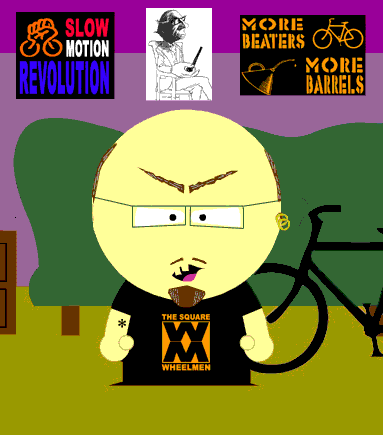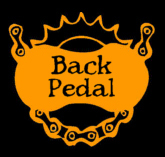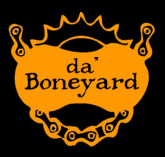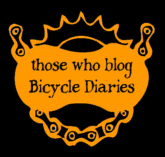29.9.08
28.9.08
Now that's a velopunk
gentleman

Stuart Kettell set off on 21st September 2008 on a 1000 mile journey from end to end of the UK on a Penny Farthing cycle. Having done many challenges for charity including a parachute jump, marathons, English Channel crossing in a Cessna and in 2007 flew around the UK Coast in a flexwing microlight fresh out of his training. This latest challenge will be very grueling especially on a Penny Farthing with solid tires and no brakes! With a 52 inch wheel at the front you cannot just stop you have to either keep going or jump off! I am also doing this with no support crew.
Labels: rolling abroad, velopunk
27.9.08
It's only been 100 years
had cagers

When Henry Ford started to manufacture his groundbreaking Model T on 27 September 1908, he probably never imagined that the spindly little car would remain in production for 19 years. Nor could Ford have foreseen that his company would eventually build more than 15 million Tin Lizzies, making him a billionaire while putting the world on wheels. Ford built more than 15 million Model Ts during 19 years of production. Historians credit the T — which Ford first advertised as The Universal Car — with launching today’s multibillion-dollar automotive aftermarket industry.
26.9.08
The critical masses

Why? In yesterday's NYTimes:
WASHINGTON — President Bush appealed to the nation Wednesday night to support a $700 billion plan to avert a widespread financial meltdown, and signaled that he is willing to accept tougher controls over how the money is spent.
Labels: Chicago, critical mass, serious shit
25.9.08
24.9.08
National Parking Day
19 September 2008
For the second year in a row, The Trust for Public Land hosted a one-day-only park next to the future Bloomingdale Trail, on the 1800 block of north Milwaukee Avenue. The trail will be Chicago's first, and the world's third, linear park converted from an elevated train line. The Park(ing) Day site was next to a future park and access point to the trail.

Additional Park(ing) Day sites included:
1350 W. Belmont Avenue (Lakeview)
Chicago, IL
9am-3pm
CB Richard Ellis
(Walton Place) West of Michigan (Near North)
Chicago, IL
8am-1pm
Chicagoland Bicycle Federation
9 W. Hubbard Street (Near North)
Chicago, IL
7am-7pm
Method Home Products
2034 N. Halsted (Lincoln Park)
Chicago, IL
7am-7pm
The Trust for Public Land
1801 N. Milwaukee (Bucktown)
Chicago, IL
6am-1pm
City of Waukegan
Madison Street (West of Genessee)
Waukegan, IL
8am-2pm
Labels: Chicago, new urbanism, rolling abroad
23.9.08
One with the hub

At the end of last week, a rather large, sodden box arrived at my office. It blessedly contained a set of Raleigh Westrick wheels with a 3speed AW hub and a front 6 volt dynohub; both from a 1970 Raleigh Superb. I'll be parting out the former to repair several 3speed hubs which have been clicking and sputtering more than is considered usual. But the latter I've already installed on that which rolls.
 A dynohub is perhaps the most elegant solution to bike lighting ever created. Unlike bottle generators, there is no drag on your tire. A ring-shaped multi-poled magnet rotates smoothly, and silently, around the axle. Sheldon "Fiat Lux" Brown (RIP) writes that the only drawback is the Alternating Current it produces. The frequency increases as the bike picks up speed. On the one hand, light output is pretty good at lower speeds; but the faster you go, the greater the risk of frying out a 6 volt light bulb.
A dynohub is perhaps the most elegant solution to bike lighting ever created. Unlike bottle generators, there is no drag on your tire. A ring-shaped multi-poled magnet rotates smoothly, and silently, around the axle. Sheldon "Fiat Lux" Brown (RIP) writes that the only drawback is the Alternating Current it produces. The frequency increases as the bike picks up speed. On the one hand, light output is pretty good at lower speeds; but the faster you go, the greater the risk of frying out a 6 volt light bulb. I'm willing to take the risk. Substantial "hills" are far and few between in the City of Big Shoulders. I rarely attain speeds above 10 to 15 MPH. The only time I'll have to watch out is on the annual 3speed Tour along the Mississippi where descending several really steep hills takes me way beyond my usual pace. In any case, I'm now waiting on a "King of the Road" Lucas generator light I got on eBay. Ah..... the sweet, sweet anticipation...
I'm willing to take the risk. Substantial "hills" are far and few between in the City of Big Shoulders. I rarely attain speeds above 10 to 15 MPH. The only time I'll have to watch out is on the annual 3speed Tour along the Mississippi where descending several really steep hills takes me way beyond my usual pace. In any case, I'm now waiting on a "King of the Road" Lucas generator light I got on eBay. Ah..... the sweet, sweet anticipation...Labels: kraftwerk, rolling abroad, velopunk
22.9.08
20.9.08
19.9.08
18.9.08
Before there were t-shirts
bright & shinnies
 With every bike event these days you get a colorful creation that announces the vision, mission, and goals as well as the myriad corporate sponsors. Even bike clubs aren't immune from the cotton pest. I mean, what the hell do you do with all those t-shirts anyway? The ones that aren't taking up space in the lower drawer of my dresser are now serving time as oil rags on the back porch bike shop.
With every bike event these days you get a colorful creation that announces the vision, mission, and goals as well as the myriad corporate sponsors. Even bike clubs aren't immune from the cotton pest. I mean, what the hell do you do with all those t-shirts anyway? The ones that aren't taking up space in the lower drawer of my dresser are now serving time as oil rags on the back porch bike shop. Before t-shirts became the commonly accepted currency for expressing your commitment to alternative forms of transportation gentleman bikers sported badges, or pins as our American cousins would call them.
Before t-shirts became the commonly accepted currency for expressing your commitment to alternative forms of transportation gentleman bikers sported badges, or pins as our American cousins would call them.  And who can't see the advantages in sporting badges. Unlike the cotton vest, a badge doesn't fade. Being much smaller, it's more flexible in terms of display. You can sport more than one at the same time, unless you're into that Seattle grunge, multi-layered thang. So here's my tribute the the badges of bikers past.
And who can't see the advantages in sporting badges. Unlike the cotton vest, a badge doesn't fade. Being much smaller, it's more flexible in terms of display. You can sport more than one at the same time, unless you're into that Seattle grunge, multi-layered thang. So here's my tribute the the badges of bikers past.
Labels: kunst, rolling abroad, velopunk
17.9.08
16.9.08
Knock down, drag out
Barak "The Terrorist Fist Jabber" Obama

Labels: Election 08, kunst, silly shit
15.9.08
Giving Europe a Soul?
"What is Europe?"
 One of Germany's foremost filmmakers, Wenders delivered the following speech at A Soul for Europe, a conference held on 19 November 2006. Declaring that Europeans must believe in the power of their own imagery, he will return to Germany in the new year to make films on his country's post-Cold War realities.
One of Germany's foremost filmmakers, Wenders delivered the following speech at A Soul for Europe, a conference held on 19 November 2006. Declaring that Europeans must believe in the power of their own imagery, he will return to Germany in the new year to make films on his country's post-Cold War realities.Translation, John Bergeron"What is Europe?"
"How is Europe?"
One has the impression
that Europe is a wreck,
fucked,
"foutue",
if you think back to the constitution disaster,
reflect on Europe's actual political influence
or on the lack of enthusiasm shown by its citizens
for "the European Cause" in recent times.
"The Europeans" have had it up to here with Europe...
On the other hand,
Europe is heaven on earth,
the promised land,
as soon as you look at it from the outside.
Over the last couple of months,
I have seen Europe from Chicago and New York,
from Tokyo and Rio,
from Australia,
from the heart of Africa, the Congo,
and, just last week, from Moscow.
I am telling you:
In each case, Europe appeared in a different light,
but always as paradise,
as a dream of mankind,
as a stronghold of peace, prosperity and civilization.
Europe:
Now you see it,
now you don't.
Those who have lived for a long time in Europe
seem weary of it.
Those who are not there, who live somewhere else,
want to get here at any price and join us.
What is it then
that some HAVE,
yet no longer want,
and for which others YEARN so much?
I can just as well ask myself:
Why is it that I find Europe so "holy",
as soon as I see it from a distance,
and why does it appear so profane, humdrum, almost boring,
as soon as I am back?
When I was young,
I dreamed of a Europe without borders.
Now, I travel back and forth
without ever having to show my passport,
and I even get to use the same currency all over,
(even if it is pronounced differently everywhere),
but where has that big emotion gone?
Here in Berlin, I am German,
in the meantime with all my heart.
Yet, hardly do you set foot in America,
than you no longer say you are from Germany, France, Italy or wherever.
You come "from Europe," or you're about to return there.
For Americans, this epitomizes culture,
history, style, "savoir vivre."
It's the only thing they feel strangely inferior about.
Even rather permanently.
And even when viewed from Asia, let alone other parts of the world,
Europe appears to be a bastion of human history,
dignity, and, yes, this word again: culture.
Europe has a soul, indeed.
No need to invent or create one for our continent.
It's there in plain sight.
It is not to be found in its politics or in its economy.
It is first and foremost embedded in its culture.
I am kicking open doors.
Two years ago, the President of the European Commission
stood here in Berlin and stated the matter quite clearly.
I quote from the end of his speech:
"Europe is not only about markets, it is also about values and culture.
And allow me a personal remark:
in the hierarchy of values, the cultural ones range above the economic ones.
If the economy is a necessity for our lives,
culture is really what makes our life worth living."
I could quote other sections of his memorable speech,
in fact I'd like to read it in its entirety,
so much he took the words out of my mouth.
But, I'm afraid,
reality looks quite different:
to the outside world, and especially to its citizens,
Europe continues to present itself first of all as an economic power,
insisting on using political and financial arguments
over cultural ones at any give time.
Europe is not taking advantage of its emotional potential!
Who loves his (or her) country on account of its politics or its economy?
No one!
Just next door, 100 metres from here,
you'll find one of the "showrooms" of the European Community.
There's one like that in every other European capital.
And what's on display there?
Lots of maps, brochures, mostly economic information,
all sorts of statistics and stuff on the history of the European Union.
What a drag!
Who can possibly feel represented there?
Who are these places trying to reach,
or boring to death?
We live in the age of the image.
Today, no other realm of culture displays so much power
than that of the image.
Words, music, literature,
books, newspapers, rock'n roll, theatre...
nothing comes even close
to the authority of moving images, in cinema and television.
Why is it that today, not only in Europe,
but all over the world,
"going to the pictures"
is synonymous with
"seeing an American film"?!
Because the Americans realized long ago
what moves people most
and what gets them dreaming.
And they radically implemented that knowledge.
The whole "American Dream"
is really an invention of cinema,
and it is now being dreamed by the whole world.
I don't want to discredit this,
but merely ask the question,
"Who is dreaming the European Dream?"
Or better: How are we encouraged to dream it?
A concrete, current example just occurred to me:
In the next 2 months or so,
some 20, 30, or even 50 million Europeans
will watch one and the same film.
It started the other day:
every channel up and down,
every programme and news show,
- and I've been surfing TV stations throughout Europe -
reported at large on a film premiere in London.
As you have probably guessed already,
all the racket was about James Bond,
that knightly British gentleman,
who has been saving the world from disaster for the last forty years.
Do you recall that magnificent Scotsman, Sir Sean Connery,
who used to embody this European hero?
Or that most elegant, cultivated Irishman, Pierce Brosnan?
Now, over Christmas and through New Year's Eve probably,
millions of Europeans will all be watching, at the same time,
somebody who looks more like a thug,
and whose resemblance to Russian President Vladimir Putin
can scarcely be denied.
This new Bond is supposedly quite ruthless
and not too particular when it comes to applying violence.
What is the message here?
What is this American production trying to tell us?
All right, I might be exaggerating,
but the heart of the matter remains pretty much true:
our own myths don't belong to us anymore.
Nothing forms our contemporary imagination so intensely,
so specifically
and permanently
as cinema.
But we are no longer in control.
It doesn't belong to us anymore.
Our very own and precious invention has slipped away from us.
European cinema
- and it exists, in spite of everything! -
is produced in almost 50 European countries,
yet in European theatres our own European stories
no longer play a significant role.
Those images of European cinema,
could help a whole new generation of Europeans to recognize themselves,
they could define what Europe is all about
in emotional, powerful and lasting terms.
These films could convey European thinking to the world.
We could communicate our most valuable asset,
our CULTURE, in a contagious way,
could spread the word of the "Open Society,"
which was so urgently invoked here by George Soros, only yesterday,
our civilization of dialogue, peace, and humanity…
But we have let this weapon slip out of our hands.
I intentionally say WEAPON,
because images are the most powerful arms of this 21st century.
There will be no "European consciousness",
no emotions and no attachment felt towards our home continent,
in brief: no future European identity,
if we are unable to project, and to absorb,
our own myths,
our own history,
and our own ideas and emotions!
Spain, for example, has no stronger and more influential ambassador
to the world than Pedro Almodovar.
For Britain that would be Ken Loach,
Andrzej Wajda or Polanski for Poland.
Although he died some 13 years ago,
Federico Fellini continues to define the Italian soul…
And that is exactly what European cinema does -
it shapes and forms our consciousness of ourselves
and of each other!
It creates a European belief,
a European will,
that very European "soul" that we"re talking about here.
However, have a look around
at the place we actually give to our TREASURE,
what a poor role it actually plays in the cultural life of Europe.
Yes, look at how European politics
continue to dismally neglect
not only cinema, but culture in general.
Yet, this is the CEMENT,
the glue that bonds European EMOTIONS!
All these countries yearning for Europe,
including all the new and future member countries from Eastern Europe,
could on one hand have the opportunity to introduce themselves,
tell us about themselves,
win us over,
and on the other hand be welcomed and embraced
by the European CAUSE
and the European SOUL…
… if only
we would provide more support for our mutual ambassadors,
if only Europe could be brought to believe in the power of images.
Mind you, a grave error is being made here.
Europe prefers to use political and economical arguments,
over emotional ones!
Next door, in the showroom,
the most boring maps are hanging on the walls,
while in our most important embassies,
in cinemas and on TV,
the superpower of imagery, America, is pulling people under its spell,
including our European citizens, of course.
These young people
now suffering from a "European withdrawal"
will one day turn against European policy makers
with the harsh and bitter reproach:
Why did you allow
a whole generation to get bored of Europe?!
Why did you just babble on about politics,
instead of SHOWING us how much our magnificent home continent
could have meant to us!
Europe HAS a cultural history,
it HAS its own culture of life, of conflict, of dialogue,
yes, it HAS an amazing political culture.
George Soros calls it "The Open Society."
And because, as he explained, America had failed in recent times
to exemplify and demonstrate its moral and political values,
Europe represents an even more important MODEL for the world.
BUT:
This model is invalid and weak
if it has no confidence in the power of its own imagery!
No one, esteemed Mr. Soros,
will be swept away, enthused and inspired by the OPEN SOCIETY,
as long as it remains an ABSTRACT IDEA.
Such a vision has to be attached to feelings,
to places, to memories.
These "European emotions" are right in front of our eyes,
you can almost grasp them,
the citizens of Europe are certainly yearning for them…
but politics is widely ignoring them.
The field of images
is largely being left to others.
I hope that Europe is not too late in recognizing
which crucial battlefield is about to be abandoned
with little resistance.
14.9.08
The Monroe Doctrine?
Venezuela's President Hugo Chavez says two Russian bombers have arrived in the country to carry out training flights.U.S. President John F. Kennedy at an August 29, 1962 news conference:
Moscow is dispatching one of its largest warships - a nuclear-powered cruiser - accompanied by a small flotilla, to the Caribbean for exercises with the Venezuelan Navy.
The Monroe Doctrine means what it has meant since President Monroe and John Quincy Adams enunciated it, and that is that we would oppose a foreign power extending its power to the Western Hemisphere, and that is why we oppose what is happening in Cuba today. That is why we have cut off our trade. That is why we worked in the Organization of American States and in other ways to isolate the Communist menace in Cuba. That is why we will continue to give a good deal of our effort and attention to it.
Labels: pensées, war stories, worldbeat
13.9.08
12.9.08
Where the cool kids are!
heard from
 The romance & ritual of velopunk is spreading. The {Old Bike Blog} launched in July last year. It came to my attention when it's author, Thom, commented on my 1st velopunk post last week. And later in August, over at wordpress, he launched another velopunk blog, The Cycling Gentleman. The main difference between the two is that {Old Bike Blog} extols the virtues of DIY; essentially the idea that old bikes are just as good (and often better) than the brand new ones. By comparison, his other blog celebrate men’s cycling style & bicycle culture.
The romance & ritual of velopunk is spreading. The {Old Bike Blog} launched in July last year. It came to my attention when it's author, Thom, commented on my 1st velopunk post last week. And later in August, over at wordpress, he launched another velopunk blog, The Cycling Gentleman. The main difference between the two is that {Old Bike Blog} extols the virtues of DIY; essentially the idea that old bikes are just as good (and often better) than the brand new ones. By comparison, his other blog celebrate men’s cycling style & bicycle culture.
In his own words:
Back in the day, a fellow would jump on his bicycle in his daily clothes and pedal off on an errand to the grocery, a visit to the barber, or a jaunt to the country. When gentlemen dressed for cycling, it wasn't in Spandex, but in trousers, jackets, and caps. This made cycling not only practical for transportation, but also quite stylish. This blog promotes a return to this sense of style for The Cycling Gentleman.
11.9.08
9.11.08 & 1918
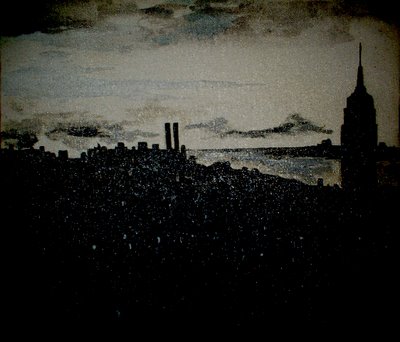
Today is the 7th anniversary of 9.11. The very fact I don't have to explain these two numbers reflects the enormity of the attacks particularly in how they changed our lives as well as the world around us.
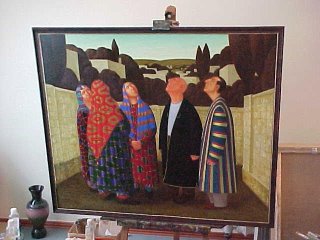 There is another aspect of this enormity. For there are as many meanings of 9.11 (here as well) as there are people who have felt the impact of the attacks over the last seven years. For example, I photographed this painting by Mirshakarov Akmal during a trip to Tajikistan in 2002. It is his response to 9.11. It alone shows that any attempt I could make to capture the meanings of this event would fall woefully short of the mark.
There is another aspect of this enormity. For there are as many meanings of 9.11 (here as well) as there are people who have felt the impact of the attacks over the last seven years. For example, I photographed this painting by Mirshakarov Akmal during a trip to Tajikistan in 2002. It is his response to 9.11. It alone shows that any attempt I could make to capture the meanings of this event would fall woefully short of the mark. I've decided to let the enormity of 9.11 speak for itself rather than adding to all words that will be written about it today. What little I will add, can be summed by Wilfred Owen, the most famous of the WWI English trench poets. In the Preface to his book, Poems, Owen wrote,
I've decided to let the enormity of 9.11 speak for itself rather than adding to all words that will be written about it today. What little I will add, can be summed by Wilfred Owen, the most famous of the WWI English trench poets. In the Preface to his book, Poems, Owen wrote,This book is not about heroes.
English Poetry is not yet fit to speak of them.
Nor is it about deeds or lands, nor anything about glory, honour, dominion or power, except War.
Above all, this book is not concerned with Poetry.
The subject of it is War, and the pity of War.
The Poetry is in the pity.
Yet these elegies are not to this generation,
This is in no sense consolatory.
They may be to the next.
All the poet can do to-day is to warn.
That is why the true Poets must be truthful.
If I thought the letter of this book would last,
I might have used proper names; but if the spirit of it survives Prussia, --
my ambition and those names will be content; for they will have
achieved themselves fresher fields than Flanders.

Owen was killed in action on 4 November 1918 during the crossing of the Sambre-Oise Canal, exactly one week (almost to the hour - the eleventh) before the signing of the Armistice. His mother received the telegram informing her of his death on Armistice Day, as the church bells were ringing out in celebration. He is buried at Ors Communal Cemetery.
Labels: history, serious shit, war stories
10.9.08
Before there was Chicago Critical Mass...
the parade
of all cyclists
From the archives of the Chicago Tribune, 25 June 1895
C. Newton Wilson Wants Chicago Riders to Turn Out Some NightAnd now a parade of all the bicyclists in Chicago is proposed. C. Newton Webb, whose office is at Room 1329, No. 315 Dearborn street, wants a turn out of not only all the club members but of all unattached riders, and makes the following proposal:
"It is suggested that cyclers of this city form a monster parade to demonstrate the popularity of cycling. The authorities place the number of wheels in this city at 85,000 and there should be 80,000 in line making a continuous procession around the boulevards, passing through the several parks. The plan is to have all cyclers start at any point the choose and all go in one direction, each one dropping out after covering the entire route, back to the place of beginning. The expense would be incurred, and as nearly all riders are out in the evening any way there would be no inconvenience and all would take pride in massing on the line of march, that the people of Chicago for once might realize the combined strength of the wheelmen of a great city, which can justly boast of having more cyclers than any other city in the world. All riders should costume and illuminate as suits their taste, and be on the designated boulevards at 8 p.m. and continue until the entire route is covered. The President of each cycle club is requested to name a committee of one, who will meet Mr. Wilson to take steps for advocating this feature for an early date."
Labels: Chicago, critical mass, velopunk
9.9.08
8.9.08
Decision 2008: 57 shopping days left
begin
Labels: Election 08, pensées, serious shit
7.9.08
6.9.08
What's in your neighborhood?
you think

Criminal Searches provides the scary-but-useful data on how many crimes are committed in your neighborhood. It's all culled from public records, and is presented as a Google Maps mashup. You can restrict your search to sex offenders, search on a specific name to get a criminal history, or do a general search for criminals by city or ZIP code. This kind of data is certainly not for the faint of heart but can be useful in assessing the safety of your neighborhood.
Labels: Lincoln Square, new urbanism, serious shit
5.9.08
Going down hill?
by Henry
Charles
Beeching
1859-1919
With lifted feet, hands still,
I am poised, and down the hill
Dart, with heedful mind;
The air goes by in a wind.Swifter and yet more swift,
Till the heart with a mighty lift
Makes the lungs laugh, the throat cry:--
'O bird, see; see, bird, I fly.'Is this, is this your joy?
O bird, then I, though a boy
For a golden moment share
Your feathery life in air!'Say, heart, is there aught like this
In a world that is full of bliss?
'Tis more than skating, bound
Steel-shod to the level ground.
Labels: kunst, rolling abroad, writing
4.9.08
The end of summer?
yesterday
& today

May thru
August

October
thru April

Labels: Chicago, kunst, that which rolls
3.9.08
The romance & ritual
 What with our enthusiasm for all things British; it looks like the classic lightweight crowd are the kool kids now. I got my first inkling when I was trawling the bike groups on Flickr. I ran across Ladies & Gents Hubb Geared Vintage Roadsters, a cool collection of vintage steeds and those who, suitably attired, love them. In our own way, we're quite the little sub-group of Steampunk. Although I have yet to see a steam-powered lightweight at the Lake Pepin Tour or the A.B.C.E., for that matter.
What with our enthusiasm for all things British; it looks like the classic lightweight crowd are the kool kids now. I got my first inkling when I was trawling the bike groups on Flickr. I ran across Ladies & Gents Hubb Geared Vintage Roadsters, a cool collection of vintage steeds and those who, suitably attired, love them. In our own way, we're quite the little sub-group of Steampunk. Although I have yet to see a steam-powered lightweight at the Lake Pepin Tour or the A.B.C.E., for that matter.
Our more mechanized cousins have been getting a bit of attention lately. Ruth La Ferla wrote in the NYTimes, 8 May 08:
If steampunk has a mission, it is, in part, to restore a sense of wonder to a technology-jaded world. “Today satellite photos make the planet seem so small,” Mr. Brown lamented. “Where is the adventure it that?” In contrast, steampunk, with its airships, test tubes and time machines, is, he said, “sort of a dream , the way we used to daydream. It’s like part of your childhood’s just bursting forward again.”
 While I agree with the sense of wonder part, it's exactly the smallness of the planet that makes velopunk possible. Many gentlemen cyclists, and their ladies, come to Lake Pepin from as far away as Canada and California. The rest of the year we communicate by email and listserve. And where would any of us be without eBay's vintage bike and spare parts categories?
While I agree with the sense of wonder part, it's exactly the smallness of the planet that makes velopunk possible. Many gentlemen cyclists, and their ladies, come to Lake Pepin from as far away as Canada and California. The rest of the year we communicate by email and listserve. And where would any of us be without eBay's vintage bike and spare parts categories? More importantly, at least for me, velopunk is all about the traditions of English Cycle Touring. Gentlemen cyclists bring their own interpretations of style and etiquette to each lightweight gathering including knickers, Norfolk jackets, and afternoon teas. That's where you fully recognize the family resemblance between velopunk and steampunk. Again, Ruth La Ferla:
More importantly, at least for me, velopunk is all about the traditions of English Cycle Touring. Gentlemen cyclists bring their own interpretations of style and etiquette to each lightweight gathering including knickers, Norfolk jackets, and afternoon teas. That's where you fully recognize the family resemblance between velopunk and steampunk. Again, Ruth La Ferla:Steampunk style is also an expression of a desire to return to ritual and formality. “Steampunk has its tea parties and its time-travelers balls,” said Deborah Castellano, who presides over salonconvention.com, which organizes neo-Victorian conventions. “It offers an element of glamour that some of us would otherwise never experience.”

2.9.08
More on cyclealities
 The Philadelphia-born, Welsh-American author and educator is best known for her Rebecca of Sunnybrook Farm (1903). She also provides the only reference to cyclealities outside the biking world. That's the good news; the bad news is that the characters in her novel, Penelope's Experiences in Scotland, are as much in the dark about this word as we are today...
The Philadelphia-born, Welsh-American author and educator is best known for her Rebecca of Sunnybrook Farm (1903). She also provides the only reference to cyclealities outside the biking world. That's the good news; the bad news is that the characters in her novel, Penelope's Experiences in Scotland, are as much in the dark about this word as we are today..."We ought really to have kept house in Edinburgh," observed Francesca, looking up from the Scotsman. "One can get a `self- contained residential flat' for twenty pounds a month. We are such an enthusiastic trio that a self-contained flat would be everything to us; and if it were not fully furnished, here is a firm that wishes to sell a `composite bed' for six pounds, and a `gent's stuffed easy' for five.
Added to these inducements there is somebody who advertises that parties who intend `displenishing' at the Whit Term would do well to consult him, as he makes a specialty of second-handed furniture and `cyclealities.' What are `cyclealities,' Susanna?" (She had just come in with coals.)
"I cudna say, mam."
Labels: books, history, rolling abroad
1.9.08
The tamming of the cruise?
critical mass
around the country

A few years ago, a CM restarted in Oxford, doing the traditional Friday evening trawl of city centre streets. I went on one and was immediately turned off by some aggressive participants. I vowed never to return.So why did I? Because, new to Oxford, on the last Friday of every month, starting at 6.30pm in Broad Street, we have Carnival Mass. Carnival Mass is all about enjoyment. It celebrates cycling in Oxford by taking traffic-free or low-volume routes around the city centre and Jericho.
.jpg)
The ride began slowly, as a phalanx of motorcycle officers basically got the ball rolling by helping the cyclists run the first batch of lights. Under the circumstances it was clearly the safest thing to do, but I'm still trying to sort it out, as were many pedestrians to judge from their expressions.

The mood was more merry prankster than bicycle hooligan as the monthly Critical Mass demonstration rolled through Seattle Friday at rush hour.
About 300 cyclists and a strong police presence marked the first ride since violence erupted last month on Capitol Hill. That encounter resulted in two bicyclists being arrested and a motorist injured. No charges have been filed, and police are still investigating.
Morristown
(New Jersey)

Friday's Critical Mass ride honored Morristown Mayor Donald Cresitello, who inspired these monthly treks when he pooh-poohed bicycle commuting one year ago.

...with the Democratic National Convention in town, bicyclists decided to hit the road Wednesday to draw attention to the relationship between bicyclists and motorists.
"Bikes are part of traffic," said participant Pau Tay. "Motorists try to intimidate bicylists off the road."
It was Kellen Sorauf's first Critical Mass ride. As he prepared for the ride, he hoped to avoid any trouble, given that many of the riders have been part of the demonstrations at Civic Center this week.
"Hopefully this is a peaceful event," Sorauf said.
There were no issues as the bikers left the park. Police followed alongside and behind the bikers a they made their way through the streets of downtown.
Labels: critical mass, serious shit, velotariat






